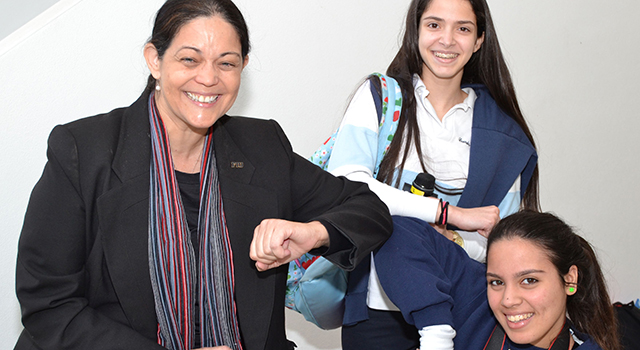By Jim Davis - Florida Catholic
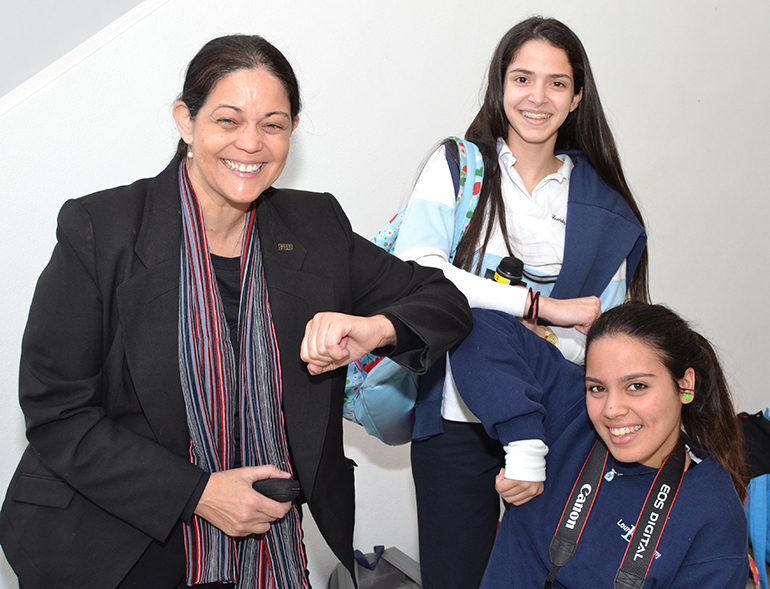
Photographer: JIM DAVIS | FC
Dr. Aileen Marty shows junior Cassandra Garcia, center, and senior Alexandria Rodriguez how to greet someone in Africa: touching elbows instead of shaking hands.
MIAMI | The first thing you notice about Dr. Aileen Marty is her bright smile. The second is how she "shakes hands" — by offering her elbow for yours to touch.
"Many countries in Africa recognize this now," said Marty, a specialist in some of the world's worse plagues — including Ebola, which she has battled in two missions to western Africa in the last year.
She discussed Ebola at her alma mater, Our Lady of Lourdes Academy. Her address was part of a series hosting speakers in various careers, such as reporters and entrepreneurs.
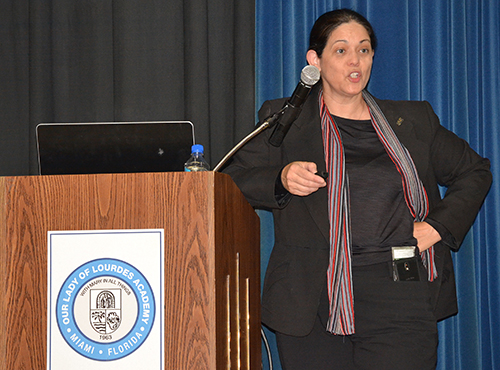
Photographer: JIM DAVIS | FC
Lourdes Academy alumna Dr. Aileen Marty speaks to students interested in medical careers at her alma mater.
Marty holds two scary titles. She's a professor of infectious diseases at Florida International University. She also serves as a consultant to the World Health Organization, working as a senior advisor for mass gatherings and mass casualties.
She said Our Lady of Lourdes Academy gave her a good launchpad for her career.
"The quality of education in a Catholic school is very high," she said. "And one of the things I learned was empathy for others. A patient is not a science experiment. You understand not only the disease, but emotional and social and spiritual needs."
Much of her Feb. 12, talk, drawn partly from her Ebola-fighting tours of Nigeria in August and Equatorial Guinea in January, was full of facts on the disease and its spread — 9,000 deaths thus far in the current outbreak. Her slide show flashed bar graphs, line graphs and microscope images of the wormlike Ebola virus.
The wide-ranging talk had some surprises:
Hiccups are one symptom of Ebola.
Another disease — rabies — kills 100 percent of its victims, yet it doesn't worry people as much.
Ebola is believed to be up to 40 million years old because it has been found in tarsiers, an ancient monkey-like primate. It also has been found in bats, antelope, gorillas and porcupines.
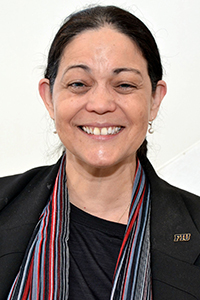
Photographer: JIM DAVIS | FC
Lourdes Academy alumna Dr. Aileen Marty speaks to students interested in medical careers at her alma mater.
During her talk, Marty also offered a glimpse into her colorful life: first researching marine biology, then attending medical school, then studying tropical medicine during her 25 years with the U.S. Navy — at one time "chasing monkeys with leprosy in west Africa."
Despite what she called the "sciency" facts, her 100 listeners — most of them interested in medical careers themselves — listened raptly and silently. They made only one sound — a stunned "Ohhhhh" — after Marty told of two men who caught Ebola, then carelessly spread it to several countries.
Ebola infections are on the rise again after falling in December because "people stopped paying attention," Marty said. Currently, each victim infects 2.7 others. The outbreak can be stopped if the rate is reduced to fewer than one to one, she said.
Part of the problem is medical workers' difficulty in treating patients through their bulky, body-covering hazmat suits. The suits cost $100 each, they can't be worn for more than an hour, and they have to be thrown away after one use, Marty said.
Recently, she hit on a simple way to cope: Give each Ebola patient something like a fitness wristband, similar to Jawbone, Fitbit and other commercially available gear. Adding a GPS connection, the bands could allow medical workers to monitor vital signs like heart rate and blood pressure without physical contact. And the $99 bracelets could stay on the patients, instead of being discarded after one session.
"It'll be less risky for us, and it'll be cheaper,” Marty said. "It'll allow better care."
She said the wristbands will be used in a pilot project this year, either in Liberia or Sierra Leone. Some patients will be given the bracelets while an equal number will receive the old-fashioned care, to see which method works better.
During a brief Q&A period, Marty was asked why some people resist treatment for Ebola. One reason is that they think they can care for themselves better. Another reason is what she called "magical thinking" — such as the attitude that "If I don’t want to be sick, I won't get sick."
Asked why she chose a specialty in tropical medicine, she gave three answers. One was an interest in how animals interrelate. Another was that the U.S. military was concerned about keeping troops healthy. The third reason was more personal: "It was a way to help impoverished people."
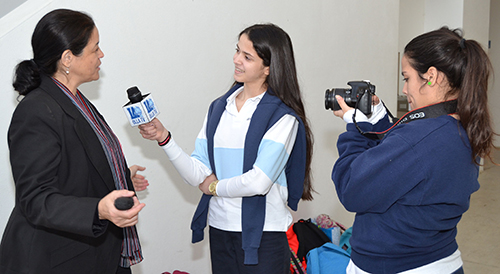
Photographer: JIM DAVIS | FC
Lourdes Academy alumna Dr. Aileen Marty is interviewed by an OLLA-TV crew, Cassandra Garcia, center, and Alexandria Rodriguez.
After the talk, Marty was interviewed for Our Lady of Lourdes's OLLA-TV. Cassandra Garcia, the interviewer, said she found the talk spoke directly to her plans for a career in medicine.
"I never thought about doing this before," Garcia, a junior, said about combating infectious diseases like Ebola. "I'm going to look into it now."
Alexandria Rodriguez, the videographer, said her whole family was in some form of medical careers, although she herself planned to go into law.
"But it's always good to learn about diseases," said Rodriguez, a senior at Our Lady of Lourdes.
Marty said her education at Our Lady of Lourdes had a lasting effect on her, personally as well as intellectually. "I bonded with other students, and they are forever my dear friends," she said.
Cuba-born Marty acknowledged another influence on her social ethic: her grandfather, who impressed a sense of duty on her. "He said we were in a land filled with caring and generous people. He said that we must give back."
She confessed that she occasionally gets tired and tempted to burn out. "You have to leave time to rest," she said. She said it helped to take college courses in philosophy and comparative religion.
"And I continue to ask questions. I've always been a searcher for truth."
But there's one issue she has never settled: the age-old question of why people suffer terrible plagues like Ebola — and why some nations are stricken worse than others.
"I don’t presume to know the mind of God, but I can be part of the solution," Marty said. "I've been trained, and I have the knowledge and the tools. Regardless of the answers, my responsibility as a human being is to help people."
Was there one thing she would like students at Our Lady of Lourdes to take away from her talk? She flashed another bright smile: "The importance of hand hygiene."
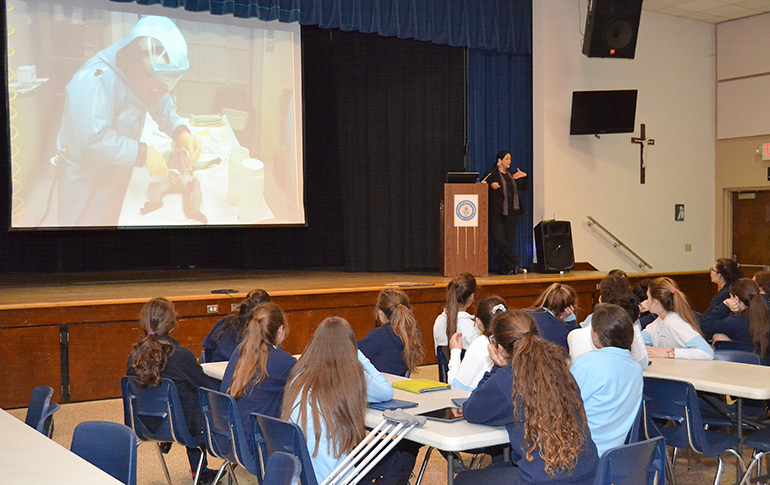
Photographer: JIM DAVIS | FC
Lourdes Academy alumna Dr. Aileen Marty speaks to students interested in medical careers at her alma mater.
